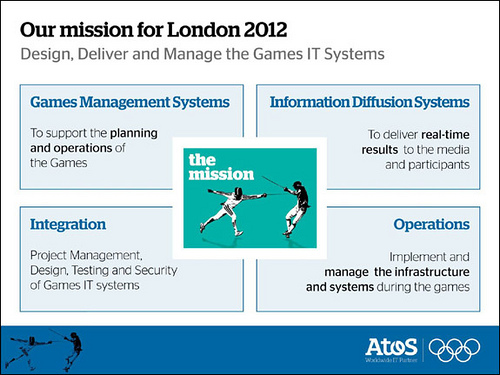


Atos International has provided IT services to the Paralympics since the 2002 Games, but the French IT company is becoming increasingly unpopular with advocates for people with disabilities in the U.K.
As athletes tested themselves against the stopwatches, scorekeepers, and their fellow competitors at the 14th Paralympic games in England, another type of drama was unfolding outside of the event venues.
It began bubbling during the Opening Ceremonies, when it was noted that athletes for the host country had tucked their ID lanyards inside their warm-up suits, effectively concealing the name of corporate sponsor, Atos. As the week progressed, a group called Disabled People Against Cuts (DPAC) staged a number of protests directed at the French IT company and Britain’s coalition government led by prime minister, David Cameron. For one example, scroll down toward the bottom of this Daily Mail article by Sonia Poulton to see Joe Hooker’s photo of DPAC group members lying on the pavement holding Atos-branded death certificates.
Make sure you also read the Poulton’s article in its entirety. It is a thorough summation of why DPAC and others who advocate for the rights of the disability community feel Atos has been complicit with David Cameron’s Coalition in reforming the welfare system in a way that strips eligibility from millions of people with disabilities, while at the same time closing down government-operated contract services facilities that had provided employment opportunities to people with disabilities for decades. She also warns against buying too deeply into the hyberbole of Channel 4‘s “Superhuman” marketing motif:
It’s a seductive idea. The premise of a disabled athlete — that of someone who will pursue their goals despite the obstacles that may surround them, including the limitations of their own bodies — is a figure of great admiration for most wide-eyed observers. But let us be under no illusion. A paralympian is no more like a regular disabled person than I am like Usain Bolt or Rebecca Adlington. Paralympians, just like Olympians, are unique in their field and should be regarded as such.
The Scotman’s Dani Garvelli delves deeper into the subject in her September 2 analysis. She speaks to advocates of people with disabilities from extreme factions like the Black Triangle Campaign Group, who say heroic narratives of Paralympians overcoming their disabilities instill a sense of “disability denial” in the public. A spokesman for the organization Capability Scotland gives a more measured response in defining the line between praising Paralympians and assuming all individuals with disabilities can attain the same level of achievement, no matter what their disability is or its severity.
The controversy even reached American shores, as The Washington Post published this August 25 article by its London Bureau Chief, Anthony Faiola. The Paralympics are little more than backdrop for Faiola, who puts Britain’s plan to cut benefits for as many as 500,000 people with disabilities by 2015 in the terms of similar austerity measures that are slashing benefits:
In Italy, the cash-strapped government is moving to trim assistance for disabled people earning more than $20,000 a year. In the Netherlands, lawmakers are cutting ‘social work places’ that provided jobs to disabled people with little or no hope of finding jobs elsewhere. Greece has suspended a program providing sign language interpreters for the deaf, making it harder for them to report crimes or defend themselves in court.
Here in America, states are turning toward “Employment First” initiatives, where they can work with organizations like ATI that provide career training and contract services opportunities for people with disabilities. Massachusetts adopted it in 2010. The goal of these measures is to provide these individuals with the opportunity to live as independently as possible, which for many will feel just like standing on the medal platform.
Comments?
Image by Atos International.